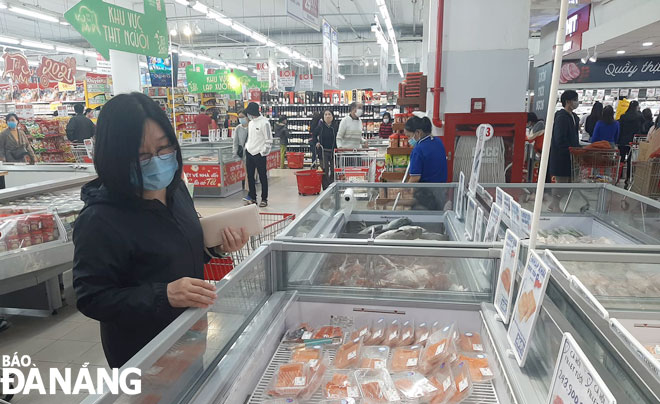Da Nang keeps close watch on imported chilled, frozen food amid COVID-19 fear
A large volume of imported chilled, frozen food products are on sale in the Da Nang market, mainly through major distributors such as trading business, shopping malls and supermarkets. Functional local agencies and distributors are jointly keeping a closer watch on food, particularly frozen products shipped from countries and territories around the world battered by COVID-19, in a bid to ensure the safety of consumers whilst maintaining the effectiveness of coronavirus prevention and control in Da Nang.
 |
| The supply of imported frozen foods over the past time has contributed to stabilising the market. Picture taken at the Big C Da Nang mall. |
In reality, the world is still struggling with the virus while some nations have detected coronavirus particles on frozen food packaging. Imported food is a potential source of infection, and the deadly virus can survive for a very long time on frozen food products, previously warned domestic experts.
The amount of imported frozen good brought into the Da Nang market is increasing day by day with a growing proportion of such items as confectionery, fruit, cheese and meat of all kinds in commercial centres and supermarkets.
As requested, before entering the domestic market, imported food stuffs must go through many compulsory stages of inspection and censorship at border gates.
According to Mr Nguyen Tan Hai, Head of the municipal Food Safety Management Board, since the end of December, 2020, under the guidelines of the Ministry of Health and the municipal government, his agency has taken samples from food packages imported from coronavirus-hit countries for COVID-19 testing.
All of the 30 samples collected from imported frozen food packages in four local large enterprises have tested negative for the coronavirus.
Till date, through inspection, no cases of the coronavirus detected on the packaging of imported cold-storage food have been reported in the city.
According to Mr Phan Thong, Director of Co.opmart Da Nang, the amount of imported frozen food put on shelves at this supermarket accounts for only about 1% of the total, the majority of which are beef, fish, and cheese of all kinds.
Before their presence for sale, all the imported goods must undergone strict inspection, supervision and testing processes at border gates, and they are transported by refrigerated trucks and then kept in cold storage and refrigerated warehousing facilities.
In particular, frozen seafood and fruits shipped from Viet Nam once again have difficulty in entering China as that country is implementing import policies to mitigate COVID-19 risks.
Worried the pandemic could reenter through imported foods, authorities in Shanghai late last year stipulated that all imports of what it called “high-risk” imported cold-storage food must be taken to transit warehouses for COVID-19 testing and have their packaging disinfected before being stored or sold in the city.
Exporters of goods to China have to provide full information about vehicle owners, vehicles, customs declaration, and goods channel.
As a large enterprise in exporting seafood products to foreign markets, the Thuan Phuoc Seafoods and Trading Corporation is taking advantage of export opportunities amid high demand for seafood in European and Asian countries. The company achieved a revenue growth of more than 5% in 2020, the positive sign triggered by its strict practice of coronavirus prevention and control measures during the transportation of goods.
Reporting by KHANH HOA – Translating by A.T